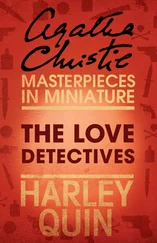Dick’s presence in their lives was a vacation from this kind of scheming. It was a foray into scheming of another kind. That Saturday when they drank their morning coffee they were already planning a second round of letters, juggling Sylvère’s laptop between toast and coffee mugs. Sylvère, a great reviser, didn’t like the sound of his first letter. And so he wrote:
Crestline, California
December 10, 1994
Dear Dick,
Last night I fell asleep thinking of a great title for our piece:
Ménage à Deux . But when I woke up it seemed too conclusive and too lame. Have Chris and I spent this past week in turmoil just to turn our lives into a text? While making coffee I came up with the perfect solution, a way of instantly reshuffling the cards. Because Dick, Chris and I have been debating whether we should send the letters that we wrote to you last night. It’s a crazy distillation of our mental state and you, poor Dick, do not deserve to be exposed to such a masturbatory passion. I imagine our 14 pages emerging line by line from your deserted fax. To even consider sending them was crazy. These letters weren’t meant for you; they were a dialectical resolution of a crisis that never was. So that’s why I thought of sending you this terse injunction:
Dear Dick, I’m taking Sylvère to the airport Wednesday morning. I need to talk to you.
Love, Chris
What are you going to do with that? Probably not answer!
Sylvère
* * *
All his life since age 19, Sylvère Lotringer had wanted to be a writer. Carrying a huge tape recorder on the back of his Vespa motorscooter around the British Isles, he’d made interviews in faulty English with all the literary greats—T.S. Eliot, Vita Sackville-West and Brendan Behan—for a French communist literary magazine. He was away from his Holocaust survivor family on the scabby rue des Poissonières for the first time and this was freedom. Two years later, studying at the Sorbonne with Roland Barthes, he wrote an essay on The Function of Narrative Throughout History . This was published in a prestigious literary magazine called Critique . The rest was history. His. He became a specialist of narrative, not a creator of it. Because the French draft for the Algerian war was on, he started trundling between teaching jobs in Turkey and Australia and finally America. Now 40 years later he was writing about Antonin Artaud, trying to find some link between Artaud’s madness and the madness of World War 2. In all these years Sylvère’d never written, really, anything he loved or anything about the War (same thing). And he remembered how David Rattray’d said once about Antonin Artaud: “It’s like the rediscovery of the truths of Gnosticism, the notion that this universe is crazy…” Well Artaud was plenty crazy and so was David. And maybe now instead of just being unhappy Sylvère could be crazy too? So he continued:
“That night with you, we caught the Western bug. Your bug. I mean, Chris and I are sensible people. We don’t do anything without a reason . So you must be responsible. I have the feeling you’ve been watching all these days with a John Wayne grin, manipulating us from a distance. I really resent that part of you, Dick. Intruding on our lives. I mean before that night Chris and I had a good thing going. Perhaps not passionate but comfortable. We could have gone on like that forever and then you came, the rambling man, with all these expatriate philosophies that we’ve outgrown ourselves over the past 20 years. This is really not our problem, Dick. You’re leading a ghost town life, infecting everyone who comes near you with a ghost disease. Take it back, Dick. We don’t need it. Here’s another fax I thought of:
Dear Dick, Why did you do this to us?
Can’t you leave us alone?
You’re invading our lives—why?
I demand an explanation.
Love, Sylvère
* * *
Were these letters sendable? Chris said yes, Sylvère said no. If not, why write them? Sylvère suggested writing until Dick returned their calls. Okay, she thought, believing in telepathy. But Sylvère, not in love but enjoying the collaboration, understood they might be writing him forever.
Crestline, California
December 10, 1994
Dear Dick,
Come to think of it, why’d you even call us Sunday night? The night after our ‘date’ with you in Antelope Valley. You were supposed to be this cool guy smoking a cigarette behind his bedroom door on Sunday morning, just waiting for us to clear out. It would’ve been totally in character not to call. So why did you call? Because you really wanted it to continue, right? You came up with this lame excuse about going to get breakfast—at 7:30 in the morning in this tiny town where the grocery store is 3 minutes away? It took you three hours, Dick, to get that fucking breakfast. So where’d you go? Did you sneak out to meet the bimbo girl who left her abject message on your answering machine? Can’t you spend a single night alone? Or were you already fighting the invasion of your mental universe by this couple of cynical rapacious libertines? Were you trying to defend yourself; or was it a trap you set, tightening it the following night with your apparently innocent call? Actually, that night I picked up the receiver for a moment and heard your voice. Such a small voice, too, for such enormous stakes. You’ve been holding our destiny in your hands for the last few days. No wonder Chris didn’t know what to say. So what’s your game, Dick? You’ve gone too far into it to keep hiding in the distance, biting your nails and listening to Some Girls or some other girls. You have to deal with what you’ve created. Dick, you have to respond to the following fax:
Dear Dick I think you won. I’m totally obsessed with you. Chris will be driving across America. We have to talk this over —
Sylvère
What do you think of that, Dick? I promise not to do you any harm. I mean, I’m on my way to France to see my family, they have security at the airport, I can’t afford to be caught carrying a gun. But it’s time to put an end to this craziness. You can’t go on messing people’s lives up like this.
Love, Sylvère
* * *
Chris and Sylvère laugh hysterically, sitting on the floor. Because Chris is a 90 wpm typist she and Sylvère maintain eye contact while he talks. Sylvère’s never been so prolific. After plodding along at a rate of about 5 pages a week on Modernism & The Holocaust he’s exhilarated by how fast the words accrue. They take turns giving DICK-tation. Everything is hilarious, power radiates from their mouths and fingertips and the world stands still.
Crestline, California
December 10, 1994
Dear Dick,
Two days ago Sylvère and I were discussing methods of disposing of dead bodies. I thought the best place might be in a rural storage facility. We visited one this week in Crestline and it occurred to me that a body could be left for quite some time so long as the rent was paid. Sylvère, however, objected that the corpse would rot and smell. We discussed refrigeration, but as far as I recall the bins have no electric outlets.
Highway medians are a notorious place for corpse disposal, and a real commentary on the public architecture of the ’80s, wouldn’t you say? Like Self Serve Filling Stations (and doesn’t that description say it all?) they’re a densely yet anonymously travelled public space where no one seems to be in charge. You don’t see people picnicking around the highway, do you? It’s not a place where children play. Medians are seen only from fast moving vehicles: a perfect condition for disposing of remains.
Читать дальше
Конец ознакомительного отрывка
Купить книгу












